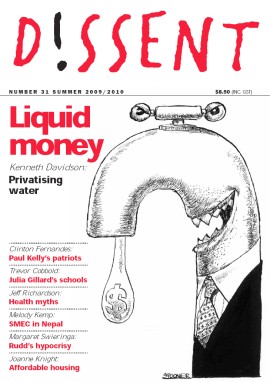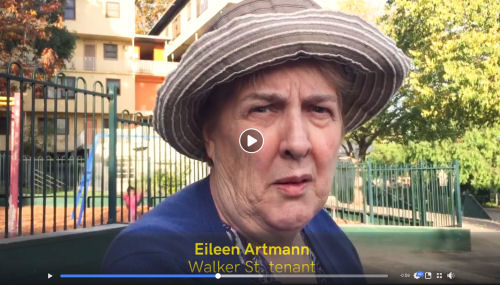
The Victorian Government is turning Melbourne into a junior version of Los Angeles without a proper cost-benefit analysis. Photo: Jason South
Before the 2002 state election I was asked to chair a meeting of Banyule citizens who had good reason to believe the Bracks government was planning to build a freeway connecting the Metropolitan Ring Road to what is now EastLink.
The Heidelberg Town Hall was full. The audience was sufficiently large and threatening that the then transport minister, Peter Batchelor, and local ALP state member Craig Langdon each promised that it wouldn't happen. From the platform, I saw the tension go out of the audience.
How easy it is to gull the electorate. The freeway was on the VicRoads agenda even before the first stage of the ring road was built. It was classic salami tactics - one slice at a time.
In parliament in 2001 Batchelor was even less circumspect. Hansard records he said: "It is not on our radar ... there is no truth in the suggestion. It is a tragic and sleazy attempt by a conspiracy of the deluded to try and frighten people living and working in this area. I need to set the record straight once and for all, and these people will have no basis for making the suggestions in the future."
Of course, Batchelor knew that by the time the plan was public, he in all probability would be responsible for a different portfolio (he is) and Langdon would know he would be on the point of retirement (he is).
Now VicRoads is seeking $15 million for a feasibility study for the road Batchelor swore wasn't even on the government's radar. On the other side of Melbourne, the government wants to fast-track Westlink, a road tunnel linking the Port of Melbourne with West Footscray and, ultimately, the Western Ring Road in Sunshine West. As usual, the further incremental transformation of Melbourne into a junior version of Los Angeles is being undertaken without a proper cost-benefit analysis to see whether there are cheaper, better public transport alternatives or a public environmental impact study. They aren't even on the radar.
And why should they be? Last October the Parliament passed the Orwellian Major Projects Facilitation Bill. The president of Protectors of Public Lands Victoria, Brian Walters, SC, said the legislation was designed to bulldoze freeways through residents' rights.
Once a project is "declared", it can be sped up and the community will have no rights of objection.
According to Walters, the hastening of big projects of developers, at the expense of the community and good planning, appears to be legislation for millionaire mates rather than the good government of Victoria.
The Brumby government appears most sleazy when it attempts to justify the handover of public land that morally belongs to the most disadvantaged groups in the community.
The government justified the sell-off of 3.5 hectares of Carlton public housing land to a developer by claiming it was essential for the social integration of public housing tenants into the broader community. Rubbish. The plans show the private development will be in the form of two gated communities, secured against public tenants by a 2.5-metre wall.
According to the Carlton Residents Association newsletter: "The much-heralded Public Housing Estates redevelopment is mostly about private housing for sale into the buoyant Carlton real estate market for private profit, and very little about desperately needed public and affordable housing. Despite 40,000 people waiting for public housing, there will be no net increase in public tenant numbers on the Carlton Estates following the $200 million development."
The redevelopment of the 27-hectare Kew Cottages site that displaced 400 intellectually disabled residents was justified on the grounds that they should be reintegrated into the community - a bogus argument that ignores the evidence that most prefer to be integrated with their peers rather than the general community who, in the main, reject them.
It was also a cruel argument because it ignored the needs of some 4000 disabled on the waiting list for institutional care and their increasingly desperate, ageing carers. Building more cluster housing on the Kew site offered the best hope of an increase in institutional care and a serious effort to reduce waiting lists.
Even worse, instead of making money for the government, the development has somehow lost $17 million from building and selling the first 55 up-market homes on one of the most valuable sites in Melbourne.
The Kew Cottages Coalition of parents and concerned citizens want the development stopped immediately, at least until the Ombudsman's inquiry into the fiasco is completed and its results published, hopefully before the election.
But this coalition is a tiny organisation with just a small bank deposit. It is up against powerful Sydney developer the Walker Corporation, which employs former Labor senator Graham Richardson as its government lobbyist. Between 1999 and 2007, the Walker Corporation donated $205,000 to the state ALP, $300,000 to the federal ALP and $300,000 to the Coalition parties. In Victoria, money talks.
Kenneth Davidson (kdavidson [AT] dissent.com.au) is a senior columnist for The Age newspaper and, with Lesley Vick, one of the two co-editors of Dissent Magazine. (see, also, below). Article originally published as "Projects built at expense of community" in the Melbourne Age of 15 Feb 10.
kdavidson [AT] dissent.com.au
Attend the "Transport for Sustainable Cities" forum
3.00-4.30pm, Thu 18 February at BMW Edge, Federation Square, Melbourne (off Flinders St).
Speakers:Professor Ross Garnaut, eminent economist, The Hon Greg Hunt MP, Federal Shadow Minister for Climate Action, and Kelvin Thomson MP, Federal Member for Wills
This is part of the Sustainable Living Festival (SLF) from 15-21 February 2010 which is well worth attending as there are many sites and events of interest. Visit the stall of Sustainable Population Australia - a PPL VIC member. It will be near the "Think Area". Collect a sticker with the message "Say No to Melbourne @ 5 Million". Contact is Jill Quirk Mobile 0409742927. The full festival program can be viewed on www.festival.slf.org.au.
(Thanks to Julianne Bell (ph 0408 022408) of Protectors of Public Lands (PPL) for providing this notice.)
In the current edition (No. 31, Summer 2009/2010) of Dissent magazine

Editorial: The National Water Initiative is based on the lie that water use efficiencies and water licence buybacks can save the Murray-Darling-Goulburn basin which supports the production of 22% of Australia's GDP. In fact state and federal governments' real aims are to create a water market fit for privatisation rather than focusing on security of supply at the lowest possible cost to users and the environment.
Clinton Fernandes questions the John Howard version of Australia's role in bringing about East Timor's independence in 1999. Howard's view is used as the basis for Paul Kelly's interpretation of events in his latest book The March of Patriots.1
Trevor Cobbold describes how the Rudd Government is undermining public education by subjecting schooling to the market forces of competition, choice and privatisation, even though, thanks to the GFC, markets are under question now as never before.
Joanne Knight applies a human rights framework as a counterweight to neoliberal market amorality which is frustrating the right to adequate housing for households whose low incomes exclude them from the market.
Dirk Baltzly reviews Amartya Sen's The Idea of Justice. Sen advocates a historical and comparative approach to political philosophy to discover which system offers more justice, as compared to John Rawls' A Theory of Justice which offers a thought experiment that would reveal an ideal system of justice to which society should aspire.
John M. Legge reviews Simon Jenkins' Thatcher & Sons: a revolution in three acts to show that Thatcherism was built around a false view of human motivation that voters are driven entirely by self-interest. This was used to coerce people into acting like greedy automatons of economic theory but Blair went further when he trashed the conventions of cabinet government, the separation of powers and the independence of the civil service.
Jeff Richardson dissects the three myths which underpin the powerful private health lobby, namely that private health insurance is a major factor in financing total national health expenditure, that a health crisis is looming because of the ageing population and that public hospital queues are evidence of inefficiency in the public system.
Margaret Swieringa points out the hypocrisy of Australia's complaints to the Chinese about their incarceration of Australian citizen Stern Hu on national security grounds without due process when the Rudd Government has made no effort to revoke similar laws passed by the previous government to counter perceived terrorist threats.
Melody Kemp discusses the Snowy Mountains Engineering Corporation's role in planning the development of a dam in Western Nepal. The growing local opposition to the project on social and environmental grounds looks likely to cause the Asian Development Bank to withdraw funding support for the project.
Stanley Schaetzel looks at human development through the prism of the history of science and finds that despite the unprecedented expansion of scientific knowledge in the last half of the 20th century the period has been characterised by growth in uncertainty because the new knowledge has generated more questions than answers.
Julia Thornton argues that if ordinary people are to deal positively with climate change they must be given a picture of a sustainable future with a detailed path to it and not be depressed into inaction.
Dianne Proctor looks at the connected issues of sustainability and population growth from the perspective of her life time involvement in NGOs dealing with family planning and women's health and reproduction. One of the biggest barriers to a sustainable population is organised religion while the best solution involves investment in reproductive health and the education of women and girls as a development priority.
|
NOTE FOR EDITORS AND PRODUCERS: For
permission to reprint articles, or for interviews, contact Kenneth Davidson or Lesley Vick on tel/fax 03 9347 7839 or email dissentmagazine [ AT ] dissent.com.au .
D!SSENT is published 3 times a year, is available on subscription and is on sale nationally at newsagents and major bookshops.
|
Footnotes
1. ↑ See also 'Interview' with Paul Kelly yet more free ABC advertising for Rupert Murdoch of 21 Sep 09.

 The Public Housing Defence Network is calling for the Opposition parties to support the Greens motion in Parliament on Wednesday 6 June 2018 to block the Andrews Governments Public Housing Renewal Programme (PHRP). The PHRP reduces Public Housing, displaces tenants, sells off public land to private developers and reduces open space and amenity, and will drive up homelessness. If you would like to stop the Andrews Government PHRP, please contact the Opposition MPs from Monday 28 May, by email, phone, or text. (See suggested letter and addresses inside.) Every action counts!
The Public Housing Defence Network is calling for the Opposition parties to support the Greens motion in Parliament on Wednesday 6 June 2018 to block the Andrews Governments Public Housing Renewal Programme (PHRP). The PHRP reduces Public Housing, displaces tenants, sells off public land to private developers and reduces open space and amenity, and will drive up homelessness. If you would like to stop the Andrews Government PHRP, please contact the Opposition MPs from Monday 28 May, by email, phone, or text. (See suggested letter and addresses inside.) Every action counts!

 We encourage you to join us in a campaign which, if supported by you, has the potential to force the state government to abandon its plans to privatise the public housing sector. This campaign is being co-ordinated by Public Interests Before Corporate Interests (PIBCI www.pibci.net) and is endorsed by PIBCI, Friends of Public Housing – Victoria and the Wednesday Action Group. We expect many more organisations to endorse this campaign over the coming weeks. Let us know if you wish to endorse the Defend and Extend Public Housing campaign:
We encourage you to join us in a campaign which, if supported by you, has the potential to force the state government to abandon its plans to privatise the public housing sector. This campaign is being co-ordinated by Public Interests Before Corporate Interests (PIBCI www.pibci.net) and is endorsed by PIBCI, Friends of Public Housing – Victoria and the Wednesday Action Group. We expect many more organisations to endorse this campaign over the coming weeks. Let us know if you wish to endorse the Defend and Extend Public Housing campaign: 

 Public housing’s operating model is unsustainable. Costs are outstripping rental income and the division is forecast to be in deficit in 2012–13.
Public housing’s operating model is unsustainable. Costs are outstripping rental income and the division is forecast to be in deficit in 2012–13. 


Recent comments